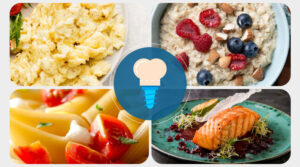One of the best advantages of dental implants is being able to enjoy your favorite foods without any discomfort. In fact, dental implants are the only long-lasting solution that lets you speak, eat, and smile just as you would with a full set of natural teeth.
However, what you eat during recovery is just as important as the procedure itself. The right diet can help ease discomfort, reduce the risk of complications, and speed up the healing process. Today, we’ll show you the best foods to eat after a dental implant surgery and which ones to steer clear of.
Immediate Post-Surgery Diet
Immediately after your dental implant is placed, your jaw and teeth will be in a very sensitive state. And, about an hour after the procedure, you can remove the gauze sponges that have been placed during the surgery and eat something if you wish to. Here, you don’t need to think too hard about whether what you’re eating is right or not because usually this meal will be provided by your doctor. However, as you continue to heal “on your own”, you need to start thinking about what you’ll be putting in your mouth.
In the first day or two following your surgery, your mouth will be sensitive, and the surgical site will need time to start healing. Therefore, it’s best to stick to very soft foods that require minimal chewing and won’t irritate your gums. For example:
Recommended Foods:
- Soups and Broths: Lukewarm, clear soups and broths are the way to go. They are easy to consume, keep you hydrated, and provide essential nutrients without putting stress on the surgical area.
- Smoothies: Blend soft fruits, yogurt, and gentle liquids to create nutrient-rich smoothies. They’re a great way to include fruits and vegetables in your diet without causing discomfort or actually chewing.
- Mashed Potatoes: Creamy mashed potatoes are both filling and soft, making them an excellent choice during this period.
- Applesauce: As it’s still very early into your treatment, you won’t be able to bite into an apple, but applesauce includes all its nutrients in an implant-safe form.
- Yogurt and Pudding: These are easy to eat and can soothe the surgical area while providing calcium and probiotics, which support overall health.

Foods to Incorporate During the First Week
Even after a week has passed since your procedure, you still need to be conscious of your choices. This is because during this period, your dental implants are fusing with your jawbone, and you may be using a temporary prosthesis, which isn’t built to handle hard or crunchy foods.
What’s more, while continuing with a soft-food diet, you need to gradually introduce protein-rich options, as they can speed-up your recovery. Plus,adding more variety to your meals can make the diet both more enjoyable and nutritious. Here are some ideas to keep your dentures safe and sound:
Recommended Foods:
- Scrambled Eggs: Soft scrambled eggs are a great source of protein, which is vital for tissue repair and healing.
- Oatmeal: This is nutritious and easy to eat, providing fiber and energy.
- Pro tip: cook it to a soft consistency.
- Soft Pasta: Well-cooked pasta with a mild sauce can be a satisfying and gentle option as you continue to recover.
- Cottage Cheese: This soft, high-protein food is easy to chew and supports bone health.
- Fish: This is a great way to ensure you’re getting the protein you need while following a “soft-food diet” guidelines.
What About Foods to Avoid?
As your recovery advances, you can gradually reintroduce more solid foods into your diet. However, to prevent damaging your new implant, avoid anything that’s hard, crunchy, or sticky, as these can irritate the surgical site and delay healing.
Here are some examples of foods that are not your friend during this period:
- Hard Foods: Steer clear of nuts, chips, and hard candies, as they can damage the implant site and cause discomfort.
- Sticky Foods: Caramel, taffy, and similar sticky treats can tug at the implant and potentially cause complications.
- Spicy and Acidic Foods: These can irritate your gums and should be avoided during the initial healing phase.
And last but not least, avoid using a straw and drink directly from a glass instead. Using a straw with a sucking motion will put pressure on the surgical site and can cause additional bleeding.
Tips and Tricks to Get Your Nutrition In Check:
It can be hard to meet all your nutritional needs when following a strict diet after a dental implant surgery. However, there are effective strategies to ensure you maintain optimal health and well-being during your recovery. Here are some tips from fellow patients and professionals:
- Eat Regularly: While recovering, it’s crucial to maintain a regular eating and drinking schedule. This not only supports a quicker recovery but also helps you feel better overall by ensuring you stay nourished and energized.
- Protein Supplements: Many patients find it challenging to get enough protein during recovery. So, to support healing, add protein supplements to your diet in the form of smoothies and/or pills recommended by your doctor.
- Monitor Glucose Levels: If you have diabetes, keep a close eye on your glucose levels during recovery. Stick to your regular eating habits and monitor your glucose frequently to avoid complications and reduce the risk of infection.
Final Thoughts
Being conscious of your diet after a dental implant surgery is directly correlated to a successful and comfortable recovery. By focusing on soft, nutritious foods and avoiding foods and items that could disrupt the healing process, you can significantly improve the outcome of your dental implants.
Remember to always follow your dentist’s post-operative care instructions and, if you have specific dietary concerns or restrictions, schedule a consultation today and we will create a treatment plan customized for your needs!

